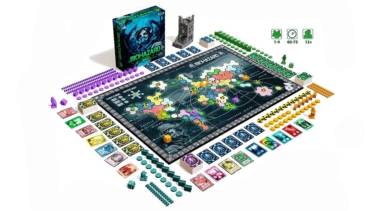
As a massive industry that contributes over $450 billion to the economy, the gambling universe is always on the cutting edge of innovation. The online betting and gambling market alone is expected to hit over $95 billion in value by 2024.
Even though it’s a massive market, the current gambling industry model is closed, rigid, and centralized, causing great friction and mistrust between casinos and players.
For instance, players often worry about their privacy and the safety of their personal information when they are playing at an online casino. How can gamblers know for sure that the casino games are not rigged?
The biggest drawback with traditional online casinos is not just the security concerns but also confidence that there is a fair and transparent distribution of gambling outcomes, payouts, winnings, and other financial transactions.
Luckily, this is an area blockchain technology (or smart contracts, to be precise) is poised to solve for the gambling industry through decentralization. Actors like Virtue Poker and FunFair have already implemented gambling solutions powered by smart contracts.
By helping to create trustless, decentralized gambling platforms, blockchain technology can put players’ minds at ease, and address pressing issues like fairness, transparency, shared data safety, and trust.
Of course, blockchain has already made major inroads into the online casino scene in the form of cryptocurrency betting. Today, there are scores of online casinos and Sportsbooks that allow players to bet with Bitcoin, Ethereum, Litecoin, and other cryptos.
Smart contracts, especially when combined with AI, will help take online gambling to a whole new and exciting level. Let’s break it down.
What the heck are smart contracts?
To understand what a smart contract is, you need to take a step back and get to know the ins and outs of blockchain. In the case of gambling, this is sometimes referred to as decentralized ledger technology.
What you need to keep in mind is that blockchain eliminates any in-betweeners, intermediaries or middlemen, thus removing any trust issues between the parties involved. That’s why the technology has worked like a charm as the backbone of cryptocurrencies like Bitcoin.
In a blockchain platform, there is a decentralized network of people (known as nodes) who must uniformly agree on a given transaction before an immutable record (of the transaction) can be made. This decentralized digital system allows for the secure execution of smart contracts and high-integrity data storage.
Smart contracts are systems built upon the blockchain network. They consist of multiple lines of code. They help to digitally and decentrally verify, facilitate and execute the performance of a contract without the need of a third party.
In the real world, a contract document can help facilitate and record a transaction with the help of a third party, usually an attorney. Smart contracts, on the other hand, are publicly available, trackable, and can’t be altered, ensuring that transactions happen as advertised.
The unalterable nature of smart contracts is truly a game-changer for the gambling industry, especially online betting. This type of contract comes at a time when the future of major gambling brands like MGM is becoming increasingly uncertain.
Smart Contracts – Improving Trust and Transparency
It is no big secret that some ill-reputed online casinos have been accused of questionable practices. Some have been reprimanded for offering unfair odds; others are said to alter payouts after the player has won.
In some cases, players have complained that certain casino games or jackpots are impossible to win. This is where blockchain smart contracts can come in particularly handy.
By using blockchain-powered software and games, online casinos can help boost transparency and trust among players. This will eventually enable online gamblers to wager with confidence because smart contracts allow for seamless, trackable and public transactions.
Even better, these transactions are stored and verified on a decentralized ledger, meaning that bets, outcomes, payouts, and winnings cannot be manipulated by anyone.
For example, FunFair recently launched a gambling platform that uses smart contracts between gamblers and online casinos. The benefits are enjoyed by both parties.
Thanks to blockchain technology, players can use their own cryptocurrency wallets, so they don’t have to make an actual deposit to the casino. The games are available for play directly from online casinos (off-chain), but any disputes can be managed or settled using the FunFair network (on-chain), which is a trustless network.
Another gambling site that is pioneering the use of smart contracts to increase transparency and trust is Virtue Poker. It’s a P2P decentralized poker platform based on the highly scalable Ethereum blockchain.
Unlike other online casinos, Virtue Poker employs the power of P2P networking, AI, and smart contracts to create a more transparent, safer poker-gambling domain.
The benefits are clear. Poker players don’t have to worry about non-payouts because their money is not held by the gambling site. Instead, player stakes are stored in shared escrow, which ensures that payouts are fair, transparent and can be made in a snap.
The biggest advantage comes in the form of the P2P card shuffling system. Since the card decks are not stored in a closed casino server, players can be certain that no rigging or suspect activity is going on behind the scenes. In other words, the outcomes are purely random. For more in-depth discussion on how various technologies are redefining the gaming experience, check out this article.
Taking Provably Fair Systems to the Next Level
In the past, what is called Provably Fair was perhaps the only way online casinos could convince players that their games are actually fair. This is an algorithm that can be analyzed and checked for quality and fairness by third-party testing firms like iTech Labs, eCOGRA, GLI, TST, BMM Testlabs, and so forth.
In practice, the only way a casino operator can cheat is via random number generators (RNGs). Smart contracts help take provably fair systems to the next level because they are available as immutable records.
In blockchain-based platforms like FunFair, RNG systems are not found in a centralized private server that can be manipulated by the casino. Instead, the generation of outcomes happens within the game itself, delivering genuinely random and fair numbers. Everything happens in a split second, so players don’t have to wait to know their fates.
Reducing Operational Costs for Online Casino Operators
Online casino operators often wrestle with hefty charges and fees related to gambling transactions. Smart contracts have the potential to help reduce overhead and operations costs for online casinos.
This is especially true when it comes to gambling-related expenses like regulatory compliance costs, licensing fees, per-transaction costs, payment processing to merchants, and other expenses. All these cost savings could be passed on to the player.
Don’t forget that smart contracts allow players to use their own e-wallets. The player’s funds don’t have to be processed from their account to the casino’s, thus helping to further cut gambling costs. It is estimated that cost reduction associated with smart contracts can bring the house edge down to around 2 percent.
Securing Player Information Online
The internet has opened doors to many possibilities, helping to revolutionize how players can conduct banking and payments. Unfortunately, this has led to the mushrooming of fraud activities, a big issue for the gambling community.
There have been cases where online casinos leaked players’ data and compromised their safety. This has led to increased incidences of data breaches, identity theft, and credit card fraud. You can’t blame players for not wanting to share their sensitive information with online casinos.
Smart contracts, AI and blockchain, in general, will address most of the issues, by allowing players to anonymously transact and play games. After all, not many people want others to know that they gamble.
Blockchain, in and of itself, is a peer-to-peer distributed ledger or network that makes it virtually impossible for transactional data to be leaked. Only the person with private keys has access to smart contract payment information. What’s more, smart contracts do away with any intermediary, so the chances of a third-party jeopardizing personal information are nonexistent.
Curbing Gambling Addiction
The conventional gambling model that is centralized and restrictive has always been blamed for rising online gambling addiction. Smart contracts can help.
Players don’t need to use a gambling account, so their money can be spent playing with winnings paid out directly to their wallets. As such, their funds don’t have to be stored with an online casino.
At the moment, a player’s funds deposited with the casino operator can be perceived as “gambling money.” With smart contracts and cryptocurrency, however, these funds can be viewed as neutral and not meant specifically for betting.
Players can instantly use their winnings to do shopping online, withdraw to their bank accounts, send to others, and whatnot. This is a game-changer when it comes to molding the gambler’s mindset. Clearly, this can help reduce the issue of excessive gambling or addiction.
Smart contracts can work in tandem with artificial intelligence to bring more order and more trust in the world of online gambling. These platforms should be built around addressing concerns like fund security, player privacy, and gameplay fairness, as well as operational cost reduction.
- What Are Social Casinos? - Feb 22, 2024
- From Slots to Screens: Navigating the Diversity of Online Casino Entertainment - Feb 14, 2024
- The 5 Best Gambling Video Games - Feb 12, 2024













